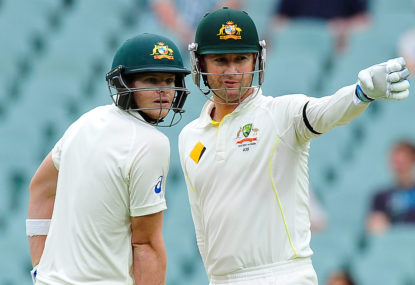So, we took that well. The general reaction to Australia losing the first Ashes Test was shock and rage. It shouldn’t have been.
The Aussie batting line-up has long lacked grit, discipline and respect for match circumstances or conditions. They are front-runners of the highest order, particularly away from home.
If we look at the home series against India last summer, the fourth highest score in each Australian innings averaged out at 50 runs. You can call it a team effort when that’s the case. Things were looking up, everything was in order, with a winning World Cup to come.
Little attention was paid to the fact that India playing Test cricket on Australian shores is about as threatening as a basket full of kittens.
Looking at the the average fourth highest score in an innings across our away series Test matches in 2014-15, from South Africa last year to the Cardiff Test last week, it’s 24.4. This is a team that falls away badly away from home. It lacks resilience.
Chris Rogers is a scrapper and grinder, whose middle name is resilience. We know what we’re going to get from him, he has mastered the art of playing within himself, particularly notable with his neatly contained clips and drives when facing the new ball.
David Warner didn’t have a great World Cup, and has struggled at Test level since, not looking the player he has proven himself to be. He looked a man completely at odds with his game early in his second innings last week, but looked to regain fluency as he went on before a lapse in concentration brought about his downfall on the lunch break.
Warner was playing like a man who didn’t want to be accused of giving his wicket away recklessly, rather than one whose attacking instincts matched with astute shot selection make him one of the most dangerous batsmen in the world. His mental state needs mending if Australia is to get back into the contest.
Steven Smith will make his presence felt throughout the series, but it’s not clear that Michael Clarke will have any significant say.
Clarke played 14 Test innings in 2014, falling for 10 or less in eight of them. In fact, he only made three scores higher than 23 last year. In five Test innings this year he is barely averaging 30. The writing is on the wall – this Michael Clarke is not the all-conquering batsman of 2011-13. He may well be fading fast.
The maturity of Adam Voges was seen as a virtue pre-series, but it wasn’t on display with bat in hand at Cardiff. If he continues to struggle while Australia lose, the ‘Dad’s Army’ jibes will haunt both player and team to the extent that there will be no coming back for either.
Next up is Shane Watson. Poor old Watto.
Selected as a batting all-rounder because of his importance with the ball, he neither makes runs nor takes wickets. His last 13 Tests have seen an average of 32 with the bat, and less than one wicket a Test, 11 in total during that time. Mitch Marsh will surely come in for the second Test.
Even though the first Test dressing room was overflowing with walking frames and Viagra, Darren Lehmann has been known to trust youth or inexperience in his time. We can recall Ashton Agar, Phillip Hughes, Usman Khawaja, James Pattinson and, oh yes, Steve Smith, from his first Ashes series in charge.
He’s not afraid to make the hard calls, and to turn to younger talents when required.
Peter Nevill is 30, so not exactly a teenager, but he is still 15 or 20 years younger than Brad Haddin. So it appeared at times in Cardiff, given the creaky movement of the latter.
The news broke last night that Haddin will not be playing in the second Test, for personal reasons. All thoughts are with his family, and we hope that all is OK on the home front.
The question of Mitch Johnson and Mitch Starc intrigues.
The Australian bowling attack can’t build sustained pressure with both of them in the side, but can it take 20 wickets if they’re not?
In Peter Siddle’s last 12 Test matches, he has taken 26 wickets at an expensive 45 runs per. But if he has rediscovered his zest, he can both contain and be a weapon. The reports from England are promising, so could it be a blessing in disguise if Starc doesn’t come up?
Of course, the other factor that has barely been mentioned across the many articles written post the first Test is arguably the most important of all – the toss.
Australia’s fallibility on slow pitches is more easily exposed when they are chasing from the get-go, and thus forced to also bat last on a wearing pitch. The effects are many and varied, where the opposition can prey on the vulnerabilities and weaknesses already discussed.
Of course, this is tough titties for them, and they get what’s coming to them in that regard. But if Michael Clarke can win the toss at Lord’s, that alone could be enough to suit Australia’s propensity for front-running, and allow them to dictate terms throughout the match.
It’s wrong that any sport should be dictated to as often as cricket is by the random nature of a toss, but so it is.
This Ashes series was never going to be as easy as the betting markets and general consensus had it. Australia is also not doomed to fail like the decisive English victory at Cardiff suggets.
These are two evenly matched teams, and it will be a winning toss here, a dropped catch there, and the ability to capitalise on periods of momentum that will be crucial.
Nothing was won pre-series. And all is not lost now.





























































































